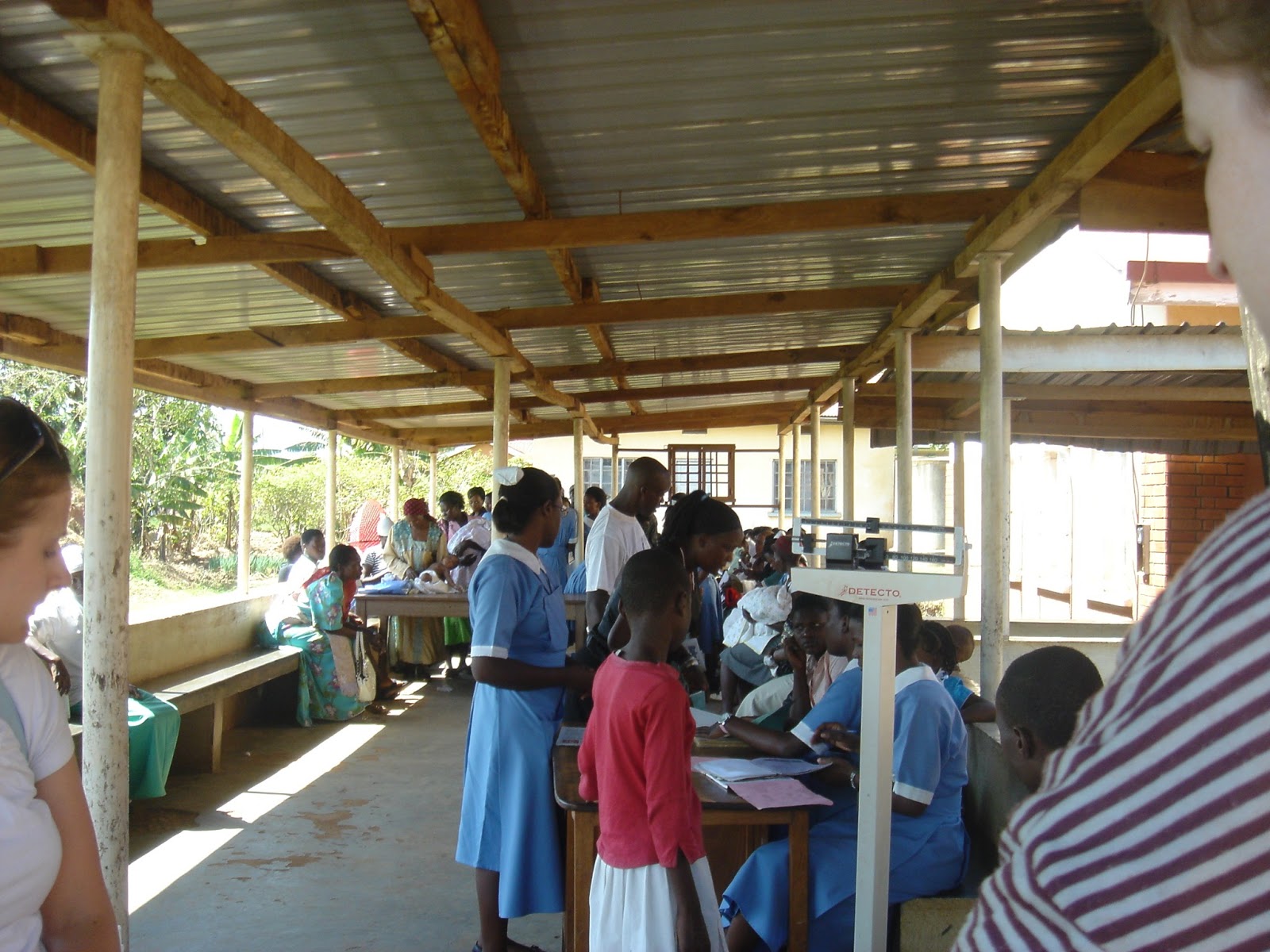Today our group went on a trip to Manyangwa, a village 20 minutes outside of Kampala. There we met with a herbal healer, a community clinic, a bone setter, and a local focus group. This post is long and rambling so I apologize in advance!
First, we visited a 67 year old community healer named Margaret. She explained to us in animated Luganda how she has used different plants she grows to treat certain diseases for the last 30+ years. I would say that she uses "traditional" Ugandan medicine but it's not quite like that... you think of traditional medicine as being passed down many generations and withstanding the test of time and experience. She explained that she didn't learn from anybody else-- that the remedies she uses come from dreams she has where an old woman tells her what plants cure what diseases. She is not actively teaching anyone else. The list of ailments she sees include colds, abdominal pain, vomiting, diarrhea, stomach worms, contraception, vaginal dryness, impotence, imperforate vagina, diabetes mellitus, demons/evil spirits. She brought out plant after plant and told us how she would boil, crush, and cook them for her remedies. She explained that everything in her house was given to her by patients who were healed. It was interesting how her philosophy of herbal remedies intersected with Western medicine. For example, she can treat diabetes mellitus but insists that her patients first go to the western medicine clinic in town to get a blood test. After feeling tingling in her toes, she herself went to the clinic to get tested. She explained that she treats many patients with HIV for their symptoms of vomiting, nausea, and diarrhea. Her own granddaughter is HIV+. Margaret takes her to Mulago for her anti-retrovirals which she continues to take. She has also bathed her in a herbal remedy and believes it has helped with the dermatitis resulting from HIV. She seems to understand that sexual activity is how HIV is transmitted and that chronic "wounds"/inflammation can lead to cancer... but she believes they are the same thing. She refuses to treat Tuberculosis patients because she knows the risks of close contacts causing infection and sends those patients to the local clinic. She herself was treated for breast cancer with what sounds like a lumpectomy at Mulago. She said she paid 450,000 shillings for a herbal drink and has not had any problems as a result. It seems that her own remedies range from 5,000-200,000 shillings. When asked, she states that she believes both herbal remedies and western medicine work. It's up to the patient to decide which they prefer. She explained that many people in the community cannot afford the expensive health care in the clinics. Because herbal remedies are so readily available and cheap, they often try those first. All of her patients are referred by previous patients who have been satisfied with her work. She pointed to a lack of compliance with western medication as a problem due to fears about side effects. There is also a fear of "cutting" and surgery leading many people to try herbal healing.
The community clinic we went to was quite the contrast. It was much more similar to a clinic in the States and included a pediatric unit, an adult medicine unit, HIV prevention, family planning, labor ward, and even an operating room for Cesarean sections. The clinic is run by nurses and general practitioners (doctors who have completed medical school and intern year but not a medical residency).
Like many of the clinics at Mulago, there was a long line of patients waiting to be seen at this clinic.
The LMP program helped build the operating room which opened in September 2012 and has hosted 8 C-sections thus far.
The bone setter was our third stop. This clinic had been around for 3 generations and the bone healer's skills were passed down from generation to generation. He explained that many of the patients at his clinic had gone to Mulago first but did not want to stay there. They felt that at Mulago they would not get proper treatment. One man even stated that he feared if they operated on him he would become septic. (I can't say I disagree.) It was interesting to see the other side of the fence since many of the patient in the ER come after several months of unsuccessful treatment by a bone setter. The bone healer uses manipulation and splints made of wooden rods to "set" the bones. If patients have X-rays done then he can look at them but otherwise he does not require they get them. The clinic sees all types of fractures (open and closed), spinal cord injury (which they treat with exercise), and chronic problems such as joint pain. In addition to herbal rubs and creams, they use diclofenac and antibiotics. He explained that it costs between 200,000-400,000 to set a bone but he does not turn away patients if they cannot pay it all upfront.

The room where the patients stay after being treated.
The outside of the clinic.

In the afternoon we met with a "focus group" consisting of healthy, local people ranging from young to old who had gathered to talk with us. It was really nice to be able to have a causal conversation with them and hear their point of view. Most of them seemed unhappy with the current health care in Uganda. They said that many years ago they could go to Mulago for a small fee but they would get the care they needed. Now that Mulago is "free", it actually costs more money. The doctors are overwhelmed with patients and some require "gifts" or extra payment to give you the attention you require. The imaging and medications often have to be purchased separately. Mulago seems to be a place that these people go when they have absolutely no other choice. Sometimes the local clinic will refer someone to Mulago and instead of going, they just go home. They called it a place of great pain. I can't say I disagree. Much of what they say is what I have seen as well. I thought I would hear more of a preference for herbal medicine over western medicine from this group. On the contrary, they seemed to prefer being seen at a western medicine clinic if not for the many barriers-- cost and lack of medical resources seemed to be the greatest. Each visit to the local clinic costs around 70,000 shillings, not including medications. The clinic in the community is understaffed and underfunded, definitely a contrast to the swarms of doctors in Mulago. A doctor at Mulago told me that >50% of the doctors in Uganda are at Mulago alone while >50% of the population lives outside of Kampala.
Our group also talked about family planning and the cultural perspective on contraception. Many of the women agreed that contraception and family planning was a good thing. One man, however, said that a doctor put a hormone implant into his wife without telling him that she would never bear children again. When he found out he was very angry and divorced his wife. Because she is no longer producing, he says. Many women admitted to taking contraception in secret. If their husband found out it would be a big problem. In a country where the average woman has >6 children, it's no secret that women are expected to bear many children. At the same time, many of the people in the group recognized how the ever increasing population has placed great strain on their health care system. One of the women told a story of a foreign group who came and placed IUDs and birth control implants for many of the women in the village. When those women suffered side effects or wanted to stop the contraception, the local clinic wouldn't help them because they were not responsible for the initial implant. This seemed to be a prime example of when global health did more harm than good and a reminder to me of the need to comprehensively explore the ramifications of those efforts.

Kids from a local school during recess/lunch. Apparently most of them had never seen a "muzungu" before.
Four more days left in Kampala! I'm definitely getting excited to come back home.
























































